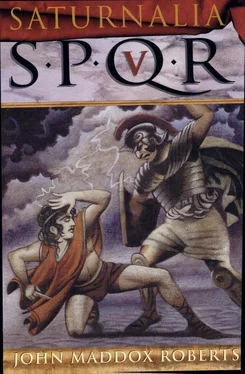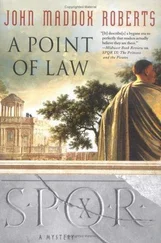John Roberts - Saturnalia
Здесь есть возможность читать онлайн «John Roberts - Saturnalia» весь текст электронной книги совершенно бесплатно (целиком полную версию без сокращений). В некоторых случаях можно слушать аудио, скачать через торрент в формате fb2 и присутствует краткое содержание. Год выпуска: 0101, ISBN: 0101, Издательство: St. Martin, Жанр: Исторический детектив, на английском языке. Описание произведения, (предисловие) а так же отзывы посетителей доступны на портале библиотеки ЛибКат.
- Название:Saturnalia
- Автор:
- Издательство:St. Martin
- Жанр:
- Год:0101
- ISBN:9780312320188
- Рейтинг книги:4 / 5. Голосов: 1
-
Избранное:Добавить в избранное
- Отзывы:
-
Ваша оценка:
- 80
- 1
- 2
- 3
- 4
- 5
Saturnalia: краткое содержание, описание и аннотация
Предлагаем к чтению аннотацию, описание, краткое содержание или предисловие (зависит от того, что написал сам автор книги «Saturnalia»). Если вы не нашли необходимую информацию о книге — напишите в комментариях, мы постараемся отыскать её.
Saturnalia — читать онлайн бесплатно полную книгу (весь текст) целиком
Ниже представлен текст книги, разбитый по страницам. Система сохранения места последней прочитанной страницы, позволяет с удобством читать онлайн бесплатно книгу «Saturnalia», без необходимости каждый раз заново искать на чём Вы остановились. Поставьте закладку, и сможете в любой момент перейти на страницу, на которой закончили чтение.
Интервал:
Закладка:
There is no finer or more enduring testament to the power and genius of Rome than our roads. People gawk at the Pyramids, which have no purpose except to contain the corpses of long-dead pharaohs. People the world over can use Roman roads. Barbarians seldom bother to pave their roads. Those who do are satisfied with a thin layer of cut stone, perhaps laid over a thin layer of gravel. A Roman road is more like a buried wall, sometimes going down fifteen feet in alternating layers of rubble, cut stone, and gravel to rest solidly upon bedrock.
The center of every Roman road is raised slightly to allow water to drain off. They span the world as straight as so many tight-stretched strings, crossing valleys and rivers upon bridges of prodigious ingenuity, tunneling through mountain spurs too large to be conveniently moved. What other people ever conceived of such roads? They are the pure expression of the uniqueness that is Rome.
All right, we learned road building from the Etruscans, but we build them better than they ever did. We certainly build them in places the Etruscans never dreamed of.
I was occupied with such pleasant thoughts as we rode toward Venusia. I had been too long among foreigners and I yearned to be in the great City again, even if Clodius was there.
Three days of riding brought us to Capua. The beautiful city, finest in Campania, was situated amid the richest farmlands in all of Italy. As we drew near we could hear the clatter of Capua’s famed bronze works. There were foundries and smith’s shops all over the city, and the din of hammering was incessant. Everything crafted from bronze, from lamps to parade armor, was made in Capua.
There was also a clatter of arms. This was not the result of war, but of training. Outside the walls of the city were a score or so of gladiator schools, for Campania was always the heartland of the sport. Romans were fond of gladiators, but in Campania they were something of a cult. As we rode past one of these, I think it was the school of Ampliatus, an idea came to me.
“Remind me when we get to Rome to enroll you in the Statilian school.”
“You aren’t going to sell me?” Hermes asked, alarmed.
“Of course not, idiot, although the idea has its attractions. But if you’re going to be of any use to me, you’d better learn to defend yourself. You’re old enough to train now.” Hermes was about eighteen at the time, a handsome youth and accomplished in all sorts of criminal rascality. It was perfectly legal to train slaves to fight and as yet there were no laws forbidding a slave to bear arms, as long as he was outside the City and accompanying his master.
“The gladiator school, eh?” I could see that he liked the thought. He had no idea how rough the training would be. Like most young boys, he thought the gladiator’s life was exciting and glamorous, unaware that a few splendid moments in the arena, dressed in plumes and gilded armor, was the result of years of bone-crunching work beneath the beady eyes of brutal overseers who enforced discipline with whips and hot irons. Of course I had no intention of having him trained for the arena, but he had to learn enough to stay alive in the sort of street fighting and midnight ambush that had become norms of Roman political life.
The Latina proved to be the wiser choice for the final stretch from Capua to Rome. Along the way we stayed at inns or at the villas of friends and relatives. Nine days of travel, with frequent changes of mounts, brought us, sore and bedraggled, within sight of the walls of Rome.
2
My father looked up from the scrolls on the table before him. “What took you so long?” he demanded. It was his usual greeting.
“The weather, the sea, the time of year, a few balky horses, the usual. I rejoice to see you well, Father.” In fact he was carrying his age well. The scar that nearly bisected his face and nose looked deeper than ever, and he had more lines and less hair, but he seemed as vigorous and energetic as always. With the censorship he had achieved the pinnacle of Roman life, but that had not lulled him into retirement. He campaigned on behalf of other family members as aggressively as ever.
“Nonsense. Like all sons, you’re panting after your inheritance. Sit down.”
I sat. We were in the courtyard of Father’s town house. The walls kept out the wind, and the late morning sun made it almost warm. “Why am I needed here? I’m far too late for Celer’s funeral.”
He brushed off the question. “Creticus wrote to me about that foolish business in Alexandria. You might have gotten yourself killed over matters of no importance to Rome.”
“It turned out to be of utmost importance to Rome!” I protested.
“But that isn’t why you got involved!” he said, slapping a palm down upon the table, making pens and ink pot jump. “It was your obnoxious love for snooping and, I don’t doubt, your weakness for the company of loose women.”
“Not women,” I murmured, “muses.”
“Eh? Stop vaporing. There is important business afoot, and for once you’ll be able to snoop to your heart’s content with the family’s blessing.”
This sounded promising. “What about Clodius?”
He shifted uneasily, not a common thing for him to do. “We’ve patched things up somewhat with Caesar, so as long as he’s in the city the little swine will probably leave you alone. But Caesar leaves Rome at the end of the year and so will you. Have you had word of Caesar’s proconsular command?”
“In Egypt we had word that he and Bibulus were getting the upkeep of the Italian goat paths and dung heaps, but in Rhodes word came that Vatinius had secured Cisalpine Gaul and Illyricum for Caesar.”
“That is true. Now the Senate has given him Transalpine Gaul as well, with his proconsulship to run for five years.”
My jaw dropped. “No one has ever had such a territory or such a period of office!” I said. “Everyone knows Gaul is about to erupt like a volcano. And they gave it all to Caesar?”
“My thoughts exactly. Most of the Senate hopes he’ll disgrace himself or get killed. At any rate, he’ll be out of Rome for five years.”
“That is foolish,” I said. “Caesar has more brains than the rest of the Senate combined. In five years he’ll build up a clientela bigger than Marius had and he’ll be powerful enough to march against Rome.”
“Do you think you are the only one to have thought of that?” He waved a hand dismissively. “It’s not your concern. Now that you’re back I will call a meeting of the family leaders. Be back here just before sundown this evening.” He returned his attention to his scrolls. That was all. I had been dismissed.
I was mystified, but I felt a profound relief. I had performed my primary duty in calling on my father. Now I could do what I wanted. So, naturally, I went to the Forum. A Roman separated from the Forum for too long suffers an illness of the spirit. He languishes and pines. He knows that, however important his work, however abandoned the pleasures of the locale, he is far from the center of the world. It felt wonderful to be approaching the spot all those hundreds of milestones had led me to.
Emerging from the warren of narrow streets and alleys into the Forum was like coming out of a narrow mountain pass onto a great plain. The vista opened up and I could see more than a narrow strip of sky overhead. The great basilicas, the monuments, the rostra, the Curia where the Senate met and which had not been burned down recently, and, most beloved of all, the temples. From the beautiful little round Temple of Vesta, they ascended to culminate in the glorious crown of the Capitol, seat of Jupiter Optimus Maximus.
But even more than the architecture, the population made the Forum. As usual it was thronged, even on a rather chilly December day. Citizens, freedmen and slaves, women, foreigners, and children of indistinguishable status, they bustled or lounged or played as the mood suited them. And the mood was one of excitement. To one closely attuned to the heartbeat of Rome, and I am one of these, the mood of the city may be sensed as a mother senses the mood of her child: frightened, sad, hilarious, indignant, angry, all are apparent to one who knows how to read the signs.
Читать дальшеИнтервал:
Закладка:
Похожие книги на «Saturnalia»
Представляем Вашему вниманию похожие книги на «Saturnalia» списком для выбора. Мы отобрали схожую по названию и смыслу литературу в надежде предоставить читателям больше вариантов отыскать новые, интересные, ещё непрочитанные произведения.
Обсуждение, отзывы о книге «Saturnalia» и просто собственные мнения читателей. Оставьте ваши комментарии, напишите, что Вы думаете о произведении, его смысле или главных героях. Укажите что конкретно понравилось, а что нет, и почему Вы так считаете.









